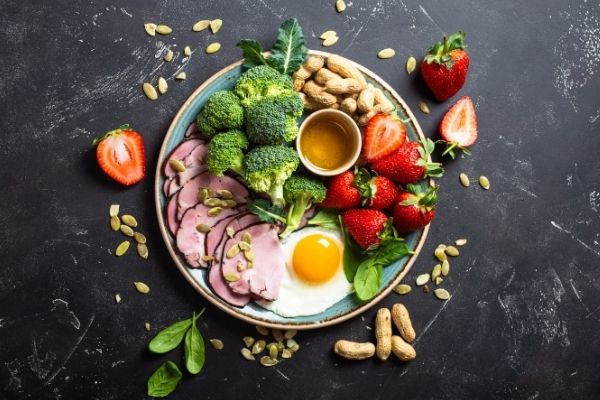If you’ve been fighting with your weight scale, you can finally make peace and say good-bye to yo-yo dieting. You no longer have to wonder which diet is the right diet. The scientific community has recently proven body transformation is a result of specific foods. Surmounting evidence demonstrates a correlation with proteins and carbohydrates and how the combination impacts your weight. By making a few changes, you can actually love your scale again!
New Research Proves Protein Has a Positive Effect on Weight
The April 2015 issue of American Journal of Clinical Nutrition recently published findings from a large study that demonstrated small changes in the diet can have huge impacts on body weight.[i] The study followed 120,784 volunteers for 16 to 24 years. In the beginning of the study, researchers found that a high glycemic load was associated with more weight gain. Foods that have a higher glycemic load effects the body negatively as it raises blood sugar. The higher the blood sugar levels, the more prone the person is to health conditions such as Type 2 Diabetes Mellitus and other metabolic syndromes and diseases. High glycemic foods are predominantly made up of pre-packaged and processed starches like breads, pastas, cakes, cookies, and other sweets.
The researchers then followed up on volunteers every four years to analyze the effect protein could have on glycemic load and long-term weight gain. They found that intake of certain proteins, like processed meats, contributed to body fat. However, weight loss was detected with quality proteins like skinless chicken, seafood, and yogurt.
The study also showed there was no association with weight gain for other proteins like milk, eggs, and regular cheese. The fat content of dairy products did not affect body weight. However, regular cheese and high glycemic foods eaten together did show weight gain. In fact, participants of the study consumed more carbohydrates when they opted for low-fat dairy foods.
Weight gain was also detected when other lean proteins, like red meat, were eaten with high glycemic foods like bread and pasta. All in all, the study proved that quality protein is important for weight loss and should be eaten with low-glycemic carbohydrates like vegetables.
Eat a Protein-Rich Diet
By focusing on a diet that is rich in protein and low in starchy and sugary foods, you can finally change your body composition. The Trilogy Medical Centers for Integrative Medicine has had great success by helping their clients make small changes with their Lean to Wellness Program. Like their clients, you too can make small changes. Increasing your protein intake doesn’t need to be difficult. Incorporating one or two quality protein shakes or smoothies into your daily meal plan can help raise your protein level which in turn lowers your cravings for starchy carbs.[ii]
Quality Proteins
Lean beef, skinless chicken and turkey, fish, seafood, egg whites, cottage cheese, and Greek yogurt are all quality proteins you may incorporate in your daily meal plan. A quality protein powder can also be used, especially when you are on the go. Before you hit the road to go to work in the morning, spend a couple of minutes preparing a quick shake or smoothie. Then drink it on your way to work or the gym. The scientific community has proven that eating a protein-rich breakfast can reduce glycemic responses and weight.[iii]/[iv]
If you opt for a protein powder, be sure it is free of genetically modified organisms (GMOs) and other chemicals. Pea, beef, and whey proteins are great options. Like any diet, you may get bored eating the same thing each day. Therefore, having an assortment to choose from will keep you from getting bored. Plus, you’ll receive the benefit of several nutrition panels by having a variety. Best of all, they come in several flavors!
Summary
Weight loss can be established with a diet concentrated in quality proteins and low glycemic carbohydrates like breads, pastas, and sweets. Be sure to have protein at every meal and snack, and start your day with a protein shake or smoothie to control your appetite for the rest of the day.
[i] Smith, J., Hou, T. & Ludwig, D., et al. (2015, April 8). Changes in Intake of Protein Foods, Carbohydrate Amount and Quality, and Long-Term Weight Change: Results from 3 Prospective Cohorts. The American Journal of Clinical Nutrition. doi: 10.3945/ajcn.114.100867.
[ii] University of Missouri-Columbia. (2013, November 14). Protein-Rich Breakfast Helps Curb Appetite Throughout the Morning. Science Daily.
[iii] Wang, S., Yang, L. & Mu, Y. (2015). High-Protein Breakfast Promotes Weight Loss by Suppressing Subsequent Food Intake and Regulating Appetite Hormones in Obese Chinese Adolescents. Hormone Research in Paediatrics, 83(1), 19-25. doi: 10.1159/000362168.
[iv] Institute of Medicine of the National Academics (2005). Energy. National Academy of Sciences. Dietary Reference Intakes for Energy, Carbohydrate, Fiber, Fat, Fatty Acids, Cholesterol, Protein, and Amino Acids (114). Washington, DC: The National Academies Press.

